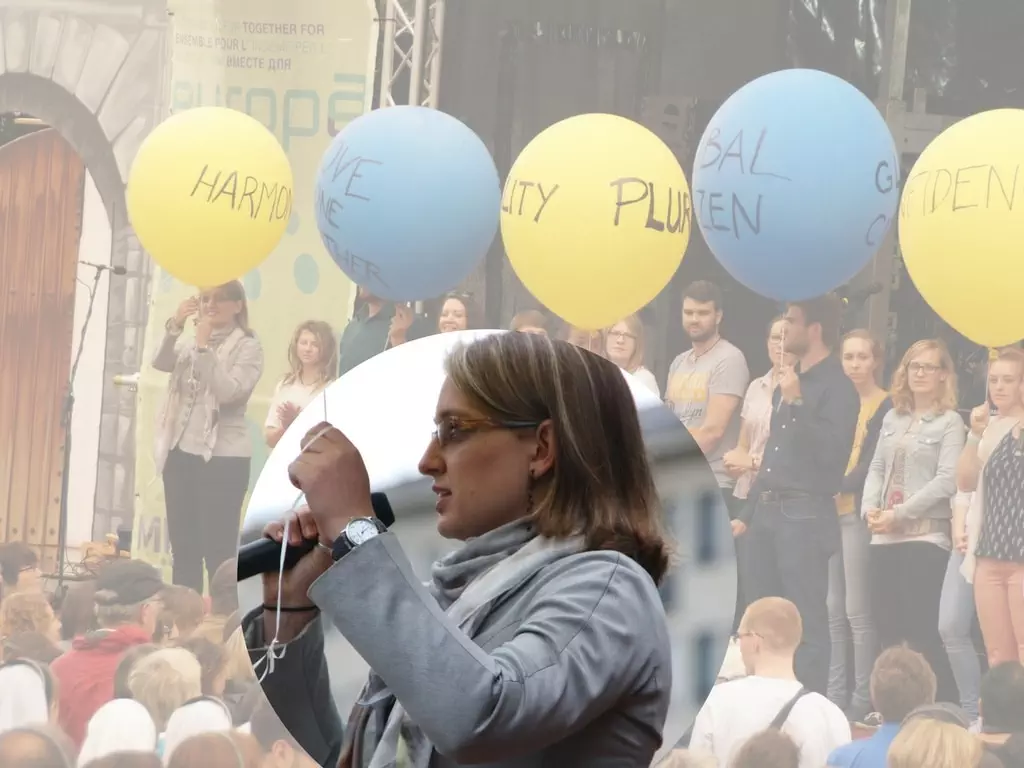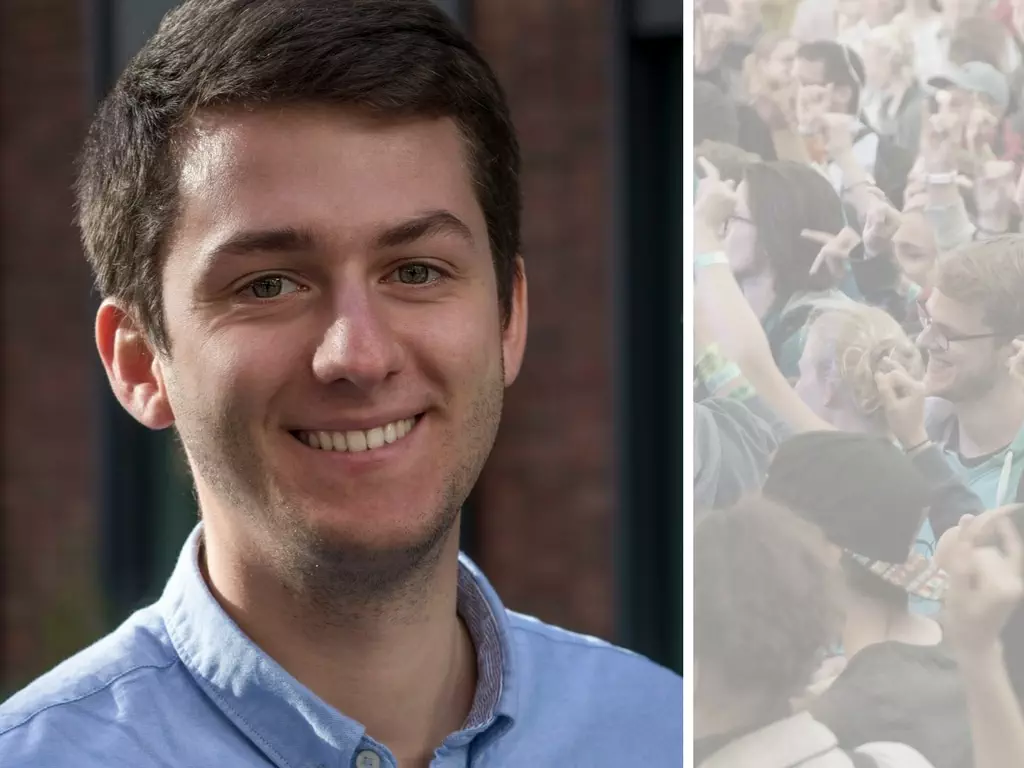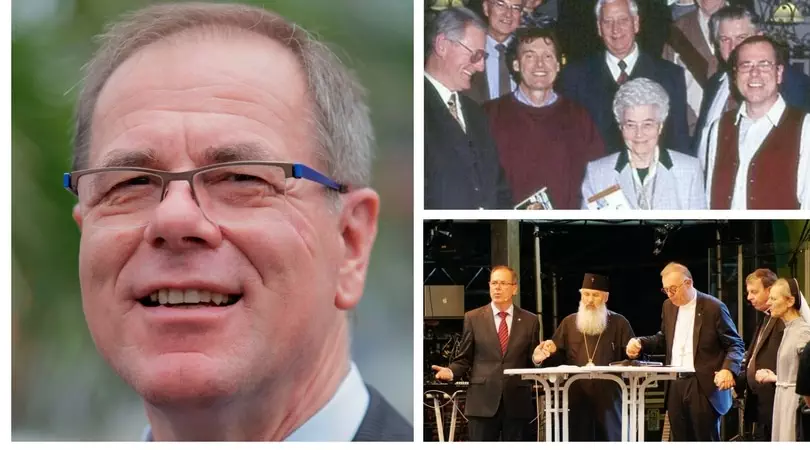
by Gerhard Pross | Apr 4, 2018 | 2018 Europe Day, Experiences, reflections and interviews, News
Since its inception 18 years ago the mandate of Together for Europe has been to work for the unity of God’s people. The second mandate is the social dimension of Together for Europe. This mandate is presented with a new challenge today in view of the current crisis in Europe, namely to live constructive, long-term “togetherness” in cultural and national diversity in Europe.
Unity is possible
At the Congress of Together for Europe in 2007 Br Franziskus stated that “Unity and diversity have the same origin.” [1] Piero Coda said something very similar: “If God is Trinity, unity and diversity are not only not a contradiction but also of the very same origin.” [2] From the very beginning we identified with an image of unity which explicitly acknowledges and affirms the diversity given to us by God. Smoothing over differences endangers identity and can lead to unity in diversity being destroyed in both political and ecclesial circles.
Unity in reconciled diversity
Because of the many divisions between individuals, Churches and peoples, a reconciliation of opposites is needed to reach a reconciled unity in diversity which also applies to cultural diversity. Reconciliation is needed, rather than condemnation and exclusion. This removes the stumbling blocks along the path towards the future because it removes what poisoned our relationships in the past, so that the stranger, the person who is different is no longer seen a threat but as a gift. As people reconciled in diversity, we experience the richness of diversity. Jesus in the midst is the one who unites. He gives us strength and hope for unity in reconciled diversity because Jesus Christ has reconciled the world with God.
“Togetherness” lived as a prophetic sign
Our togetherness in Europe is lived out in practice through our relationships with one another. We set out towards others. “Togetherness” in Europe allows new relationships to be formed, fosters reconciliation and builds a future. It allows something of God’s nature to be revealed by bringing about unity. It is therefore a prophetic sign.
Prayer brings about change
Prayer is part of Together for Europe’s mission. We do not want to deprive this Europe of our prayers. Prayer brings about change. It changes us, it changes the atmosphere in our own country and in Europe, it changes people’s hearts.
Our hope and our “Yes” to Europe
We are committed to Europe because we have understood this as God’s mandate for us. We say a decisive “Yes” to a Europe of unity as well as cultural and national diversity thereby revealing to us a positive image of Europe. We commit ourselves to a culture of “togetherness” based on Christian faith. Our hope for Europe is expressed in 5 “Yeses”.
We say “Yes” to a Europe of reconciliation
A new Europe has emerged from the miracle of reconciliation following the catastrophe of two World Wars. We receive the power of reconciliation from our Christian faith which enables historical wounds to be healed and leads to “togetherness” in diversity.
We say “Yes” to a Europe of unity in diversity
We recognize that we are enriched by diversity. Multiplicity and diversity have the same roots. Both need to balance each other out. We are glad about those who are different and their charisms. This interplay of charisms serves towards the unity of God’s people and the unity of Europe. We advocate a federal Europe. We treat different backgrounds and perspectives with respect and appreciation.
We say “Yes” to a Europe of encounter, dialogue and peace
Mutual understanding grows from encounters. This is one of our main experiences in Together for Europe. We say “Yes” to a Europe that seeks dialogue and chooses the path of negotiating for different interests. The process of the unification of Europe and the EU gave us 70 years of peace within Europe. Anyone who over-emphasizes national interests will evoke the nationalist demons and will lead the way to the destruction of Europe. Anyone who denies national identity, denies diversity and makes it impossible for a European community to be formed. We encourage open political dialogue which promotes a peaceful Europe.
We say “Yes” to a Europe of mercy and humanity.
Christianity has shaped the history of Europe. It is a faith that is open to the world. Humanity and mercy flow from Jesus Christ, crucified and forsaken and are shaping the continent and both are manifested in an unconditional “Yes” to life, “Yes” to marriage and family, “Yes” to the poor and needy.
Europe is more than the Euro, more than a market economy. We therefore advocate a Europe based on its Christianity-Judaic heritage where openness towards those who think differently and live by a different faith is the norm. This is how the “soul” of Europe is being strengthened.
We say “Yes” to a Europe which over the course of history has been called by God [3]:
Its mission is to foster the collaboration between heaven and earth, to impregnate the world with faith, because heaven and earth have met in the Crucified One. Our mission for Europe also entails responsibility for Africa and the Middle East.
The living God has entrusted a lot to our “togetherness” which is why we want to publicly express our “Yes” to Europe in our movements.
Gerhard Proß, Meeting of ‘friends’ of TfE, Vienna, November 2017 (abridged version)
[1] “Together on the journey” ISBN 978-3-00-022045-6, Br. Franziskus Jöst at the 2007 T4E Congress in Stuttgart, p. 21
[2] Piero Coda in “Christian Culture in one Europe” by Hanspeter Heinz [Hrsg], p. 33
[3] P. Lothar Penners at the European meeting of friends in 2016 in Castel Gandolfo with reference to Pater Kentenich
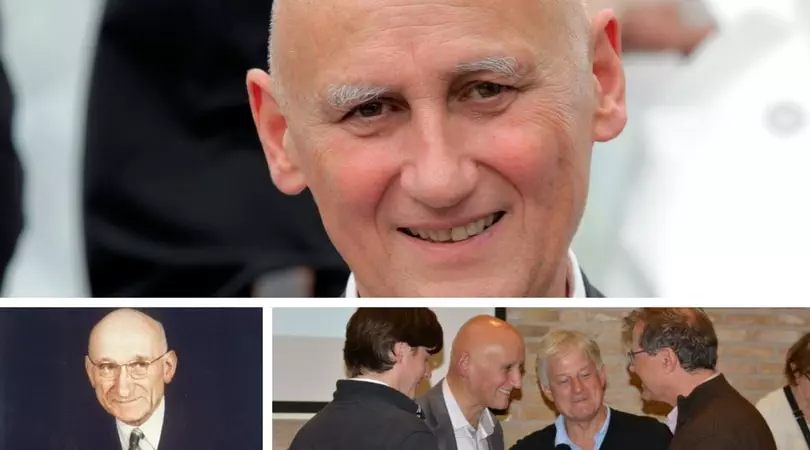
by Gerard Testard | Apr 4, 2018 | 2018 Europe Day, Experiences, reflections and interviews, News
The European Union is an organisation that is often not seen favourably by the public. Politicians not infrequently criticise it, at times in order to defend their own questionable internal politics.
The European Union cannot be said to be without defects (there are many related to standards, complexities, technocracy and detachment from people…).
In spite of this, thanks to the European Union, Europe has lived peacefully for over 70 years. Robert Schuman, one of “founding Fathers of Europe” and at the time the French Minister of Foreign Affairs, launched the European project on 9th May 1950. Schuman was a well-known figure, a practicing Catholic, who showed a deep spiritual life and great moral values. He was the right person at the right time to work towards French-German reconciliation, a ferocious opponent of the spirit of vindication that was primed to remerge. His view in this respect was contrary to the Treaty of Versailles, which put the end to the Great War.
Originally from Lorraine region, born in Luxembourg and brought up in Germany, he maintained his connection to France. He referred to himself as the ‘man of the border’ and had a vision for Europe. He defined his European ideal in a small book written at the end of his life, entitled “For Europe” which was published in 1963, the year of his death. The book contains his talks and describes his European project and his vision of democracy. Below are some quotations which have been taken from this book.
* * *
Quotations by Robert Schuman
Europe will not be made all at once, or according to single plan. It will be built through concrete achievements which first create a de facto solidarity. (Declaration of 9th May 1950)
Following quotations are from Schuman’s book «Pour l’Europe»
“The contribution which an organised and living Europe can bring to civilization is indispensable to the maintenance of peaceful relations.”
“Europe before being a military alliance or an economic entity must be a cultural community in the highest sense of expression”.
“Political unity does not signify the absorption of the nation.”
“Who does not dare to stand up to that which is bad, defends badly that which is beautiful.”
“Democracy owes its existence to Christianity. It was born the day that man was called to realise in this temporary life, the dignity of each human person, in his individual liberty in the respect of the rights of each and by the practice of brotherly love to all. Never before Christ had comparable ideas been formulated.”
“Have we taken the wrong path? The result will to a large extent depend on the calibre of people before us, the extent of their honesty, the understanding we can gain of them and of their followers.”
“May from henceforth this idea of a reconciled, united and strong Europe become a watchword for the younger generations desirous of serving a humanity free at last from hate and fear.”
“Europe will acquire her soul in the diversity of its qualities and aspirations. The unity of these essential conceptions can be conciliated with the plurality of traditions and convictions and with the responsibility for personal choices. The present arrangement cannot and should not remain a technical and economic enterprise. It requires a soul, the conscience of its historic affinities and its present and future responsibilities, a political will serving the same human ideal.”
“Borders maintain their raison d’être if they can elevate their function to a spiritual level. Rather than barriers that divide, they should become the lines of contact where material and cultural exchange takes place.”
With regards to his Declaration of 9th May Schuman has stated that he made it because of his belief in Europe’s Christian foundations.
by Gérard Testard
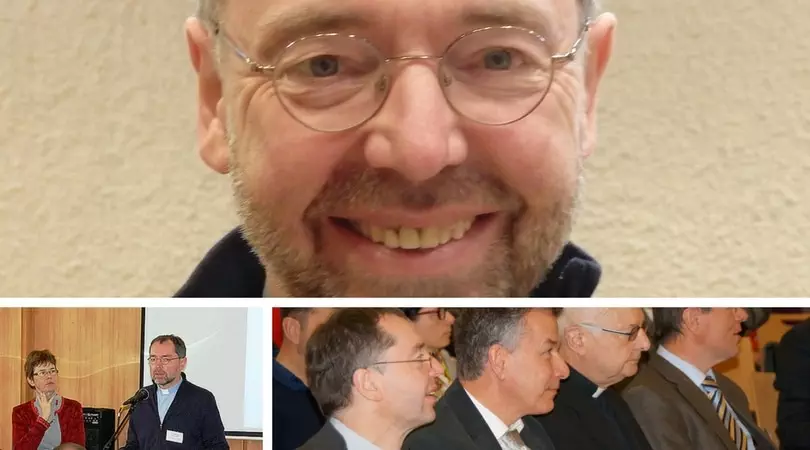
by Matthias Leineweber | Apr 4, 2018 | 2018 Europe Day, Experiences, reflections and interviews, News
When Together for Europe was launched on 31st October 1999 on the day the Joint Declaration on the Doctrine of Justification was signed there was a real sense of hope in the air.
It was an important sign of unity after almost 500 years of division. Various spiritual communities and movements from Protestant Churches and the Catholic Church met in the Ecumenical Life Centre in Ottmaring to consider how this fundamental declaration could be received. This declaration had to become more than mere words. It had to have an impact on everyday life. Karl Barth once spoke of Christians carrying a Bible in one hand and a newspaper in the other.
Over the centuries since the reformation of Martin Luther and other reformers, serious conflicts have arisen from the divisions and disputes between Christians rendering them unable to fully accomplish their mission as instruments of unity and peace. These splits were a sad sign of weakness in the face of dramatic events which reached crisis levels in the 20th century with the outbreak of two world wars and the abyss of the holocaust.
Nevertheless, Christians were still credible witnesses. When John Paul II announced a Great Jubilee for the Year 2000 he spoke of how today’s Church had again become a church of martyrs and more than ever before. According to the Polish Pope who had experienced the oppression of the Church in his own life, this had become an ecumenical phenomenon. Not only because it affects Christian of all traditions but also because the Christians persecuted in the gulags and concentration camps have already had an experience of unity in suffering which needs to be built on. Andrea Riccardi gives a moving account of this story in his book “Salz der Erde, Licht der Welt”.
The historic signing of the Joint Declaration marked the start of a new story of unity and collaboration. In response to so much division and violence that had originated in Europe the movements wanted to help to build a Europe which works for peace, hospitality and openness. Globalisation has brought about unity in economics, money and communications, yet the soul is missing, the unity of peoples and cultures living together peacefully and openly is missing. This is where the movements recognise their vocation, a second vocation to that of their own charism.
We have experienced various episodes in the story of Together for Europe which is now approached its 20th anniversary. There was the euphoria following the introduction of a single European currency and extension of the European Union to former Eastern bloc countries in 2004 which was tangible at the first major congress in Stuttgart. The movements wanted to strengthen and support the process of European unification since, according to the Christian ideals of the founding fathers of European unification which celebrated the 60th anniversary of the Treaty of Rome in 2017, this process needs spiritual foundations. Europe needs a soul as we continue to emphasise.
There is increasing scepticism regarding Europe. There is the alarming tendency towards isolation, walls are being built and Europe is becoming a fortress which ostracises people and turns them away. Much of European society is in the grip of widespread fear which is also affecting Christians. This dangerous fear has led to a rise in pro-exclusion nationalism, xenophobia and antisemitism and the birth of extreme right-wing and fascist movements which are having an increasing influence on European politics.
So the question of our vocation for togetherness needs to be addressed with greater urgency than before. As conflicts increase, Christians and Christian movements need to deepen their togetherness. Our way has always been marked by hospitality and openness. Unity is only possible by being open with, getting to know and welcoming one another. Audacious and prophetic Christians are needed precisely in this phase of history since the current trends in European society today are dangerous and promote violence. And it is the poor, refugees, foreigners and all those who live on the edges of society who suffer.
Europe Day on the 9th May gives us a unique opportunity to highlight the beauty and enrichment of unity. We can show how diversity, openness, hospitality and welcoming the stranger, rather than being a threat, actually represent an enrichment for everyone. Diverse movements were born from the Gospel, each with their own stories, vocations and charism and no-one is taking anything away from them. Quite the contrary. Through meeting one other we have enriched one other and deepened our own charism. This experience is needed more today than 18 years ago in Ottmaring when we started our journey together.
Matthias Leineweber, catholic pastor

by Chiara Lubich | Apr 4, 2018 | 2018 Europe Day, Experiences, reflections and interviews, News
Chiara Lubich, one of the initiators of Together for Europe, spoke several times about the communion between the Movements and Communities of various Churches. An excerpt from a talk she gave to the leaders of Catholic and Evangelical Movements in Munich, on 8th December, 2001, can inspire us.
“The first thing we can ask ourselves is: are the Movements, of the kind we now see present in the main Churches, inventions devised by the Holy Spirit only for this age? Oh no! – we would have to answer – they have always existed, at various times, ever since Christianity was born. Just take a look at our common history of the first millennium, and we already see them appear. What is the reason? We know it. Christianity is present in the world because of faith and the Word lived. And we know how the early Christians lived our religion authentically. But we are also aware of how, over the years, because of the influence of the spirit of the world, not all the baptized have been coherent to the faith and so Christianity languished and became watered down. But since it cannot be extinguished, “the forces of hell will not prevail” (Mt. 16:18), there was a need, so to speak, for the Holy Spirit to give rise to new spiritual currents in the Church, including some very important ones, like those of Basil, Augustine, Benedict, etc. Then there were many others during the second millennium, like that of Francis of Assisi, who had precisely the task of bringing back the authenticity and radicalism of the Gospel to the Church, so renewing it. And it is for this same reason that the Holy Spirit has aroused, today too, our modern Movements. (…) Among many movements an ever deeper community has developed.
And what did we do? We began to live communion in this way. First: by praying for one another; then by encouraging each other, helping each other in difficulties; by making sure that the respective Councils got to know one another; by giving concrete help when others needed something, for example meeting rooms or equipment; by participating and collaborating in each other’s activities; by giving space for presentations of other Movements in our publications, etc. (…)
But here arises a question: how can we make our own this wonderful plan of God, which despite our weaknesses and our failures, foresees a vibrant and ever wider communion in the Church,? It is evident – to create communion everywhere, it would be enough to put into practice the new commandment of Jesus. (…)
“Who can separate us from the love of Christ who has bound us together in this way?” It will be because of this life of communion of ours, which bears witness to the world, that the name of God will come back into fashion in our streets, often frozen by materialism and secularism; in our homes, in our schools, in workplaces, in local government. We already bear witness, especially on the most advanced frontiers, the places where, in general, the Church cannot arrive by normal means, but where our Movements are often present. In fact, the Holy Spirit has called us to this and has therefore made us particularly fit for it. (…)
Because that something which should distinguish us, before the world, is not so much our prayer or other wonderful things like penance, ceremonies, fasts, vigils, moral conduct, etc., what should distinguish us is only our mutual love, unity. Jesus said: “By this will all men know that you are my disciples: if you love one another” (Jn. 13:35). By this and not by anything else, and he also said: “May they be one so that the world will believe” (Jn. 17.21). “

by Marie Kilbergrova | Mar 26, 2018 | 2018 Europe Day, Experiences, reflections and interviews, News
How do you see Europe in the overall context of world politics?
Europe is a continent that people talk about a lot and one that perhaps considers itself to be the centre of the world. Is this a bit selfish? There are other problems in the world than the European ones.
9th May is Europe Day: how would you like this day to be celebrated by Europeans?
By highlighting those things that we as Europeans have in common.
It seems that young people do not show a great interest in Europe’s future. Do you think this is true?
I think this depends on each person. I know that I could take a more active interest myself. I believe that the majority of young people does take an interest – those who are studying, and those who are starting to work for example, because they need to secure a future for their children. Europe is our home now and into the future. At times it appears as though there is no point in taking an interest in politics, because many people who are in positions of power do not set a good example.
What do you think about populist tendencies? How can we make things better together?
I do not like populism. All the slogans in the run up to the elections and then… In what can we put our trust? Who can we believe? I often do not agree with those who are in positions of power, but I am not sure how to make a difference so that justice can win. However, we need to recognise that there are also many positive things happening. Our people want change. I hope that the future will bring positive changes. However we need to start from ourselves, as always. Instead of criticizing others we must give the best of ourselves to our neighbours, family and friends.
Marie Kilbergrová, Czech Republic

by Tomas Angelovic | Mar 20, 2018 | 2018 Europe Day, Experiences, reflections and interviews, News
Young people don’t seem to be very interested in the future of Europe. What do you think?
I don’t think this is true. Many of them are interested but they are not visible. Only the ones who don’t want Europe to be united are visible. They want to divide us, and they want each country just to look after its own interests. They are the ones who are more active than those who see Europe as united. This has to be the big change for all of us, that we become pro-Europe, for a united Europe.
How do you see Europe in the context of world politics today?
Europe has to show a good example of democracy, unity and mutual cooperation. It needs to show that democracy provides a better way of living.
It’s “Europe Day” on the 9th of May. What does this date mean to you? How would you like Europeans to celebrate it?
It’s an important date for me. It’s a day when everyone should celebrate fact that we live in peace, at least in most of Europe. This doesn’t necessarily mean that everyone will be out celebrating in the squares. Everyone will celebrate in their own way but we should all experience the joy of being a citizen of Europe.
If you were President of the European Commission (that is, if you had a position of influence and responsibility), what would be the main items on your agenda for safeguarding and even promoting unity among the people of Europe?
Firstly, I would tell everyone that, as members of the European Union, we are all equal before the law and have the same rights. Yet in recent years people from certain countries belonging to the European Union have only been able to see the differences – the West as developed and the East as lagging behind. On my agenda I would write: tell the citizens of the EU that we are all equally important and that we all matter.
Does Europe have a future? What contribution do you see churches, movements and the Christian community making, for example, to the future of Europe?
Europe has a great future! Europe is really important for the world and should be an example. It should show that we are united (this is the more difficult part), and it should show that it is capable of welcoming everyone. It’s up to the Churches and Movements to show everyone we are not “hypocrites”, people who say one thing and do another. We have to be open to others and welcome them. This applies not only to immigrants from countries outside the EU, but also to those within the EU. We shouldn’t distinguish between people from Eastern and Western EU.
What do you think of current populist tendencies? It would surely be better to travel together but how … ?
This is one of the most difficult questions at the moment. In the last few years we have seen political parties being elected in almost every European Union country (and further afield) who have succeeded in spreading populist propoganda. This is what happened in Slovakia and it wasn’t just a political party. At the end of February 2018 a journalist and his fiancee were assassinated. He was only 27 years old and had been writing an article exposing a link between the government (various populist parties) and the mafia. As a result, many Slovakians decided to march together, to protest and show that they no longer want these populists. They marched together, peacefully, without violence. They were afraid but without hatred. This is an example of “how” to walk together, being united not only as members of the European Union but as European citizens.
Tomas Angelovic, Slovakia, 27 years old; studies political science; also completed a course of study at Sophia University in Loppiano (Italy).





